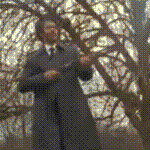WhiskeyJuvenile posted:a weighted graph is literally math; it's like saying "do it with addition" Bliski and Alice both are handwaving as hell as to what constitutes an "abstract idea" because the SCOTUS was trying to make 101 do the lifting of 102 and 103 and to a lesser extent 112. Alice in particular has sections where it reads more like an exploration of the novelty of programmed computers and the obviousness use of software to implement a method than it does a test of what is an "abstract idea". They also discuss how things can cover every implementation of an "abstract idea" while not having much detail or structure, which reads a heck of a lot like a problem with scope of enablement. Hot Dog Day #91 posted:There should be a separate court only for patents...some kind of different circuit. But here's the catch: nothing gets sent up to scotus. We have something similar to that now and it is what got us into this mess. The CAFC was extraordinarily expansive in what they considered patentable and non-obvious until the SCOTUS started smacking them down. They have also ratcheted up the burden of proof for Examiners to reject a patent over the years.
|
|
|
|
|

|
| # ? May 16, 2024 16:57 |
|
If the federal circuit wasn't such "patent everything w/e" garbage the supreme court wouldn't need to try to intervene and be confusing.
|
|
|
|
after glancing at the last several pages, I can tell you that mediocre government attorneys with no background in the sciences are VERY confused about patents.
|
|
|
|
Hot Dog Day #91 posted:after glancing at the last several pages, I can tell you that mediocre government attorneys with no background in the sciences are VERY confused about patents. I was recently told in no uncertain terms that you need a PhD in engineering or similar credential to work in patents in the private sector. Is that really true?
|
|
|
|
Ogmius815 posted:I was recently told in no uncertain terms that you need a PhD in engineering or similar credential to work in patents in the private sector. Is that really true? Generally, it's an expectation, and is often a requirement. The rule, with rare exceptions.
|
|
|
|
Why would you need a PhD instead of just a masters. They really like dissertations?
|
|
|
|
evilweasel posted:This is not at all a contradiction, logical, legal, or otherwise. The patent is on the successful implementation of the idea. The copyright is on the code used to implement it. OK but the catch in software is that those two things are the same. quote:Few programs have anything patentable in them. Apple, Google, Oracle, Microsoft, Facebook, IBM &c all disagree with you and are willing to spend billions to defend their position in court.
|
|
|
|
Munkeymon posted:OK but the catch in software is that those two things are the same. Nope. A software patent covers the implementation, not just the code you used.
|
|
|
|
sugar free jazz posted:Why would you need a PhD instead of just a masters. They really like dissertations? If you have a PhD expert they need a PhD expert. Most patent agents just have a BS in engineering though right?
|
|
|
|
All the guys I knew in law school who took the patent bar only had a BS.
|
|
|
|
Munkeymon posted:OK but the catch in software is that those two things are the same. No, they aren't. If I write code to implement a sort algorithm, copyright covers the specific expression of that - my specific code. If someone else reimplements that sort algorithm using the same exact approach, but writes it independently, they don't infringe because it's an alternative expression of that idea. Now if someone patented that sort algorithm (leaving aside the issue of novelty and subject matter for the moment), anyone who writes code to implement that sort algorithm, even if they do it with a different approach to how it should be implemented, infringes. Patents cover ideas. Copyright covers expressions of ideas. quote:Apple, Google, Oracle, Microsoft, Facebook, IBM &c all disagree with you and are willing to spend billions to defend their position in court. They're also right. And to whoever asked, no, you don't need a PhD to work in patents in the private sector - except for life sciences, where you do. In the electrical/mechanical world, most people just have a BS. PhD is a nice bonus, but not mandatory. Experts are a totally different ballgame and most of them have PhDs.
|
|
|
|
evilweasel posted:Nope. A software patent covers the implementation, not just the code you used. Potential terminology confusion alert: for a CS person 'the implementation' is exactly the source code used (well, and perhaps the binaries derived thereof).
|
|
|
|
OddObserver posted:Potential terminology confusion alert: for a CS person 'the implementation' is exactly the source code used (well, and perhaps the binaries derived thereof). CS people don't understand patents and I will thank you not to try to make me understand how they think. A better way to think of it might be that patents cover everything a piece of pseudo code describes, while copyright only covers your C code implementing that pseudo code (and wouldn't cover someone else's C implementation of that pseudo code.)
|
|
|
|
evilweasel posted:Nope. A software patent covers the implementation, not just the code you used. OddObserver posted:Potential terminology confusion alert: for a CS person 'the implementation' is exactly the source code used (well, and perhaps the binaries derived thereof). Yeah, I think we might be talking past each other here as I'm not sure what an implementation could even be other than the source code that the machine runs. Kalman posted:CS people don't understand patents and I will thank you not to try to make me understand how they think. Oh good so we're back to that
|
|
|
|
Patents can't cover algorithms as algorithms are just math. Patents can cover processes though!
|
|
|
|
hobbesmaster posted:Patents can't cover algorithms as algorithms are just math. Which are algorithms.
|
|
|
|
Kalman posted:Which are algorithms. Which is why the machine or transformation test came out of Gottschalk v Benson and Bilski
|
|
|
|
hobbesmaster posted:Which is why the machine or transformation test came out of Gottschalk v Benson and Bilski which would have been more persuasive if the Court had identified something that failed M-or-T but was still patentable (or vice versa). e: I think it's all bullshit, because a general-purpose programmable computer with a program installed isn't a particular machine nor has it been transformed: it's still a general-purpose programmable computer.
|
|
|
|
And thus the U.S. Patent system is hosed and nobody really knows what is supposed to be patentable!
|
|
|
|
hobbesmaster posted:And thus the U.S. Patent system is hosed and nobody really knows what is supposed to be patentable! hell, examiners haven't even been given guidance on how to identify an abstract idea in the first place other than "if it looks like Bilski or Alice"
|
|
|
|
with respect to 112, the level of description for enablement is usually pretty low in software cases. most of the time, I think that one of ordinary skill could put the invention into practice from the claim text alone.
|
|
|
|
I'd like to take a step back here and ask- how much of this problem could be resolved with improved USPTO funding? I've heard some pretty dire things about both their processing and direct legal budgets.
Discendo Vox fucked around with this message at 22:19 on May 29, 2015 |
|
|
|
Discendo Vox posted:I'd like to take a step back here and ask- how much of this problem could be resolved with improved USPTO funding? I've heard some pretty dire things about both their processing and direct legal budgets. None, really. The problem stems from that the Federal Circuit thinks everything under the sun is patentable, and then the Supreme Court comes in and tells them they're idiots, but because the Supreme Court justices aren't patent experts, they can't write a clear test. So the legal standard is really muddled, and the PTO is stuck trying to guess at what the Federal Circuit will do now that they've been slapped down by the Supreme Court twice. No amount of funding will fix that. It could fix some other issues, but not the fundamental issue of "what is patentable" being vaguely defined in the law.
|
|
|
|
Discendo Vox posted:I'd like to take a step back here and ask- how much of this problem could be resolved with improved USPTO funding? I've heard some pretty dire things about both their processing and direct legal budgets. At this point, none. If we could go back in time, almost all of it - a lot of the jurisprudence in 101 (Bilski, Alice) is because the judges didn't feel confident in 102/103 to strike down a patent, but didn't want to let it live either, so they half-assed it into 101. With a more effective search procedure (better paid examiners with more time to search who feel more comfortable rejecting poo poo forever because they have better art) half these decisions never would have had to be made. At this point? Increased funding (so that there's larger amounts of time dedicated to searching) will still improve patent quality somewhat but they won't fix the morass that is 101 subject matter. Also it would have to be a pretty big increase in funding. A halfway decent search firm is charging 7k or so for a search in English literature, so you'd be looking at increasing fees by 10x or more, which would finish off the notion of the individual inventor for good (which would mostly be a good thing, honestly.)
|
|
|
|
Well, my knowledge is mostly from the FDA/HHS side of things. FDA could get an 8x increase in federal funding, and even if Tobacco (which is a portal into hell I won't get into) didn't exist as an area, they would still have to make difficult priority expenditure decisions. Budgeters started cutting into bone in the 80s, and they've never really stopped.
|
|
|
|
Kalman posted:At this point, none. If we could go back in time, almost all of it - a lot of the jurisprudence in 101 (Bilski, Alice) is because the judges didn't feel confident in 102/103 to strike down a patent, but didn't want to let it live either, so they half-assed it into 101. With a more effective search procedure (better paid examiners with more time to search who feel more comfortable rejecting poo poo forever because they have better art) half these decisions never would have had to be made. For reference, given my hourly rate (and I'm near the top of the pay scale) and the hours I am expected to complete a search in, an examiner is paid around $500 to perform a search. Regarding 101, give the USPTO substantive rulemaking authority
|
|
|
|
WhiskeyJuvenile posted:a weighted graph is literally math; it's like saying "do it with addition" Math and software are really far less distinct than seems apparent to the average observer. The Curry-Howard Isomorphism unifies proof theory and computation theory by showing that every computer program is isomorphic to a formal mathematical proof. This isn't mere analogy; mathematically they're one and the same just as much as 2 + 2 = 4. This also isn't between algorithms (to the extent that they're distinct from the programs embodying them) but actual encoded machine instruction computer programs. When a computer scientist says that it's not possible to compute something, they don't mean that we don't know a way or we don't know a practical way, they mean that the existence of such a program proves that the laws of mathematics are self-contradictory. This is possible because that program is a proof that can be used to construct a second proof that disproves the first proof.* So I don't see any way to say that "software can be patented" while at the same time "math can't be patented" without hinging on meaningless distinctions. It's the computer science equivalent of "This indictment is against the 14th Amendment Person JOHN DOE while I'm the Flesh-And-Blood Person ((John; Doe*&)())" The only way it seems to avoid that is to allow patents that don't in fact rely on the inherently mathematical behavior of the software being used. The question is what's actually left after that? Whatever it is, it's not worth the effort of making the distinction. * BONUS FUN EXERCISE: That second proof is also a program. So the halting problem asks if it's possible to write a computer program that can look at any other computer program and decide in a finite amount of time if it always halts for all possible inputs. Given a function called halts() that takes a String and returns true if the program encoded in the string always halts, write a program that makes halts() return the wrong answer for at least one input and give the input that breaks it. Hint: The input's also a computer program Additional Hint: The first hint does not mean that you need to write an additional computer program 
|
|
|
|
Applied math can be patented, though, which is why everything you just wrote doesn't matter. That's where the problem comes in, and it's why the general read as "math can't be patented" isn't actually that useful in practice. (I mean it is incredibly useful to me because I am a better lawyer than troll lawyers and 101 arguments at this point come down to "who's a better lawyer" so we win them regularly, but it isn't useful in any meaningful theoretical sense.)
|
|
|
|
Kalman posted:Applied math can be patented, though, which is why everything you just wrote doesn't matter. That's where the problem comes in, and it's why the general read as "math can't be patented" isn't actually that useful in practice. Can be patented as in the dance where the applicant pretends they made a purpose-built machine that does something or you can just submit the proof?
|
|
|
|
Munkeymon posted:Can be patented as in the dance where the applicant pretends they made a purpose-built machine that does something or you can just submit the proof? Applied.
|
|
|
|
WhiskeyJuvenile posted:hell, examiners haven't even been given guidance on how to identify an abstract idea in the first place other than "if it looks like Bilski or Alice" It's been a long time since I've worked at the USPTO (almost 10 years?), are the internal publications public? As in, is there a website I can go and read about their internal guidance on how to apply Bilski or Alice? Someone at our company got their first Bilski rejection this year. Looking at their application, and comparing it to prior patents that have been approved, I would guess at least half of all software patents granted prior to Bilski fail the test -- assuming the examiner actually applied the test correctly.
|
|
|
|
Chuu posted:It's been a long time since I've worked at the USPTO (almost 10 years?), are the internal publications public? As in, is there a website I can go and read about their internal guidance on how to apply Bilski or Alice? http://www.uspto.gov/patent/laws-and-regulations/examination-policy/examination-guidance-and-training-materials These are the memos we got
|
|
|
WhiskeyJuvenile posted:http://www.uspto.gov/patent/laws-and-regulations/examination-policy/examination-guidance-and-training-materials And they are just as muddled as the source opinions they are based on. I asked five different people about Alice and this one application I was examining and somehow got six answers. It is a really poo poo-show. I'm surprised that Ultramercial doesn't get more attention than just a "this claim found invalid" example honestly.
|
|
|
|
|
Shifty Pony posted:And they are just as muddled as the source opinions they are based on. I asked five different people about Alice and this one application I was examining and somehow got six answers. It is a really poo poo-show. I would have given those claims an Alice 101 e: That's the best part about 101: an examiner can't get in trouble one way or the other
|
|
|
|
Can anyone explain what he means byKalman posted:Applied. ?
|
|
|
|
Munkeymon posted:Can anyone explain what he means by "Just the proof" is math, applied math requires the application to some sort of machine or process that transforms something.
|
|
|
|
hobbesmaster posted:"Just the proof" is math, applied math requires the application to some sort of machine or process that transforms something. Oh
|
|
|
|
hobbesmaster posted:"Just the proof" is math, applied math requires the application to some sort of machine or process that transforms something. Problem being of course that math applied to a general computing platform is still pretty indistinguishable from math. I think that's why alice has the supreme court moving away from allowing them to be patented on general purpose hardware. Of course IANAPL, or even a lawyer.
|
|
|
|
Condiv posted:Problem being of course that math applied to a general computing platform is still pretty indistinguishable from math. I think that's why alice has the supreme court moving away from allowing them to be patented on general purpose hardware. That's not what a patent lawyer means by "applied," and SCOTUS was definitely not saying that math on general purpose hardware is unpatentable in Alice. Depends very much on what the claim says the math does.
|
|
|
|

|
| # ? May 16, 2024 16:57 |
|
So help me see how this works. I'm genuinely curious as to where the line is supposed to be drawn, because I still don't know what you precisely mean by applied. Suppose I develop a general-purpose sorting algorithm. I then work out an extremely fast implementation of that algorithm in Python. The sorting algorithm itself is not patentable? So I can't control the mathematical formulas or the abstract description of the algorithm. However, is my specific Python implementation patentable, so that someone who developed a C version could then patent theirs? Or must I embed that implementation in another context; i.e., GoRPsort for Excel or GoRPsort for Django? Or is it something else entirely? I just picked sorting algorithms because it's a common computational task that's mathematically well-understood.
|
|
|
























